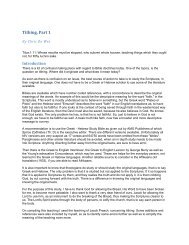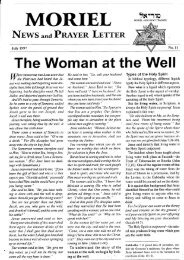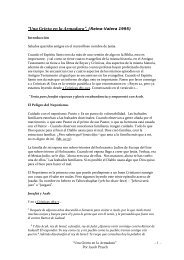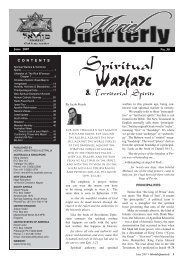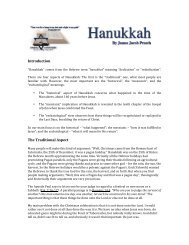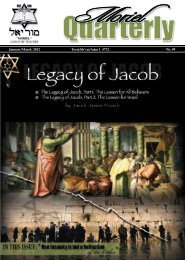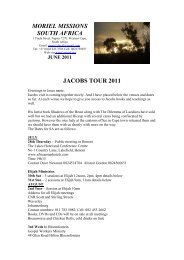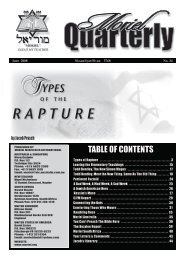April/June 20 No. 46 Nisan/Iyar//Sivan 577 - Moriel Ministries
April/June 20 No. 46 Nisan/Iyar//Sivan 577 - Moriel Ministries
April/June 20 No. 46 Nisan/Iyar//Sivan 577 - Moriel Ministries
You also want an ePaper? Increase the reach of your titles
YUMPU automatically turns print PDFs into web optimized ePapers that Google loves.
choose about sin is when, where, and how,<br />
but not to sin they cannot choose. As believers,<br />
because God’s Spirit is in us, we have a<br />
choice–we do not have to sin. God gives us<br />
back our free will; we can choose to walk according<br />
to the Spirit or the flesh. Calvinism,<br />
in effect, denies the restoring work of Jesus<br />
Christ when He died and rose from the dead<br />
and gave us a new nature. God gives us back<br />
free will when we are born again. We have no<br />
free will before we are reborn and we cannot<br />
choose to be born again until God quickens<br />
us. That is what it means to be “Arminianist.”<br />
Types of Calvinism<br />
Then we have a more moderate form of<br />
Calvinism to the left of Wesleyan Arminianism<br />
known as “Four-Point Calvinism,” and<br />
then beyond that is a “Five-Point Calvinism”<br />
which, similar to Finneyism on the opposite<br />
extreme borders on the heretical. Let me explain<br />
what I mean about “Four-Point” and<br />
“Five-Point.”<br />
There is debate among church historians:<br />
“Was Calvin a ‘Calvinist’?” “Calvinism” as<br />
we know it was not formulated by Calvin or<br />
from Calvin’s Institutes, but by something<br />
known as The Remonstrance of Dort. It was<br />
Calvin’s followers who later began to define<br />
Calvinism in the sense we know it. In<br />
the same way we must make something of a<br />
distinction between Wesley’s own personal<br />
beliefs and Wesleyan Arminianism, we have<br />
to make something of a distinction between<br />
Calvin’s own beliefs and what has come to be<br />
known as “Calvinism.” Classical Calvinism,<br />
which came out of The Remonstrance of Dort<br />
is called “TULIP,” an acronym or an acrostic.<br />
“T” = “Total Depravity” Calvinism and<br />
Arminianism both believe we are totally<br />
depraved. What does that mean? It does not<br />
mean we are as bad as we are capable of<br />
being; biblically we cannot get any worse.<br />
It just means we are totally fallen in body,<br />
mind, and spirit. Man is so fallen spiritually<br />
even his bodily members are taken with sin.<br />
He is totally depraved. It is like a six egg<br />
omelet where five of the eggs are good but<br />
one of the eggs is bad; the whole omelet is<br />
contaminated. Calvinists and Arminianists<br />
both believe in “Total Depravity,” that we<br />
cannot save ourselves and we are fallen.<br />
“U” = “Undeserved Grace” I totally<br />
agree, Wesley would have totally agreed–we<br />
all agree, that God’s grace is undeserved.<br />
Christ died for the ungodly; while we were<br />
yet sinners Christ died for us (Rom. 5:8). We<br />
cannot do anything to earn salvation and it<br />
is a sin to even think that we can. (This is<br />
the rudiment of Calvinistic thought which I<br />
will explain shortly.) It was the reaction to<br />
the heresy and corruption of medieval Roman<br />
Catholicism.<br />
A Reaction to Catholicism<br />
John Calvin was a Humanist scholar. <strong>No</strong>ne<br />
of his ideas were really original. He was a dynamic<br />
personality and a capable writer, but<br />
his ideas all came from Erasmus of Rotterdam,<br />
Martin Luther, and others from the first<br />
generation of Reformers and the Humanists<br />
before them. He was a Christian Humanist,<br />
but he was still a Humanist.<br />
During the Renaissance of the Middle<br />
Ages a heresy was represented by people<br />
we know as “Thomists” (people influence<br />
by Thomas Aquinas), which was known as<br />
“Medieval Scholasticism.” Frances Schaffer<br />
explained it very well. What it virtually<br />
came to mean in the Renaissance was that<br />
although man was fallen, his intellect was<br />
not. (Do you see how nonsensical it gets?)<br />
And so all this religious argument begins revolving<br />
around man’s intellect as not having<br />
fallen, but only his spirit. Even the Reformers<br />
never totally rejected Philanthropism,<br />
but the Humanist scholars who influenced<br />
Calvin, and Calvin himself who was a Humanist<br />
scholar, set out to correct this error in<br />
medieval scholarship and delved into Gnostic<br />
hermeneutics and a lot of other things. So<br />
Calvin was reacting to Roman Catholicism<br />
in the Renaissance of the Middle Ages which<br />
said man was not totally depraved.<br />
Secondly was the issue of “Undeserved<br />
Grace.” The Roman Catholic Church’s teaching<br />
is sacramentalism and selling indulgences.<br />
(That is how the Vatican was built and<br />
what triggered the Reformation.) Luther reacted<br />
against Tetzel the Dominican: “When a<br />
coin in the coffer rings a soul from purgatory<br />
springs.” This trite saying expresses the belief<br />
that somehow one can earn salvation by<br />
buying it or by good works, and this is still<br />
found today in places such as Italy. It is terrible<br />
to see elderly women trying to go up the<br />
stairs–the Scala Sancta–on their knees with<br />
rosary beads trying to get their mothers out<br />
of Purgatory. Calvin was very likely acting<br />
against the depravity of Roman Catholicism.<br />
The “T” and the “U” we both agree on,<br />
but then Calvin gets into the “L.”<br />
The Beginning of Digression<br />
“L” = “Limited Atonement” or particular<br />
redemption. “Behold, the Lamb of God who<br />
takes away the sins of the world” (Jn. 1:29).<br />
Jesus said, “If I am lifted up…I will draw<br />
all men unto Myself” (Jn. 12:32). Calvinism<br />
asserts that maybe He draws, but He is not<br />
intending to save everyone He is drawing,<br />
only the Elect, only the predestined, only<br />
those He foreknew.<br />
God is omnipotent (all powerful); He is<br />
omniscient (all knowing). It is impossible to<br />
describe God with human intellect. Of course<br />
He knows the future. Of course He knows<br />
who will be saved. Of course He knows the<br />
one who will react to His grace. He chooses<br />
the ones He knew would respond–that is<br />
Arminianism. Calvinists say no, that it is<br />
only the ones whose names were written in<br />
the Book of Life from the foundation of the<br />
world and that is all there is to it. <strong>No</strong>body<br />
else is going to be saved as their name is not<br />
in the Book, and there is nothing anyone can<br />
Feature Article – Continued<br />
do to get their name taken off the “hell book”<br />
and into the Book of Life because that is the<br />
way they were born.<br />
This is quite sad, is it not? One of the<br />
two versions of Christianity which cause<br />
the most mental illness perhaps, although<br />
the Jehovah’s Witnesses have a higher rate<br />
of mental illness than the general society, is<br />
Roman Catholicism. Take a country like Ireland<br />
with its very high instances of alcohol<br />
abuse, its high instances of child abuse and<br />
homosexual pedophilia–all of that stuff is<br />
built up in a psyche, a social psychology that<br />
is influenced by the Roman church. The sexual<br />
repression because of the influences of<br />
Augustine’s Manicheanism and other such<br />
things begin to manifest themselves in different<br />
ways. Roman Catholic countries have<br />
a lot of mental illness and a lot of alcoholism.<br />
But look at the other extreme.<br />
I was in Bible college with people who<br />
grew up in strict Presbyterian backgrounds<br />
in <strong>No</strong>rthern Ireland and Scotland. They went<br />
from one extreme to another. Roman Catholicism<br />
teaches one gets saved by works<br />
and by the sacraments, so they are always<br />
working to get saved, driving themselves<br />
neurotic and giving themselves a guilt trip.<br />
Because faith without works is dead and<br />
works are evidence of our faith (Ja. 2:17)<br />
extreme forms of Calvinism say one has to<br />
do these works to prove they are saved. “I<br />
must be saved because look what I am doing.”<br />
Neither one of them seems to give a<br />
real assurance of salvation. Neither of the<br />
extremes gives the people psychologically<br />
an assurance of salvation and a real peace.<br />
The modern forms of Calvinism do not<br />
drive people crazy. Having a mother who was<br />
Irish-Catholic I can tell you that Irish-Catholicism<br />
is a form of mental illness. And so is<br />
Hassidic Judaism. I have seen both close up.<br />
My family is a combination of both Jewish<br />
and Catholic and I have seen both sides of it.<br />
“Limited Atonement” asserts that Jesus<br />
died only for certain people, full stop. So say<br />
the Calvinists; not so, say the Arminians.<br />
“I” = “Irresistible Grace” This says no one<br />
has a choice. If God put a name in the Book<br />
of Life before the foundation of the world,<br />
they have to be saved, they must be saved,<br />
and they will be saved–they have no capacity<br />
to choose or to reject Jesus; that is it. God<br />
chose us, we have not chosen Him, therefore<br />
we cannot even respond to Him except<br />
that He has ordained our response to Him.<br />
“P” = “Perseverance,” which is “once<br />
saved (unconditionally), always saved.” <strong>No</strong>tice<br />
I said “unconditionally.” I believe “once<br />
saved, always saved,” but it is conditional; it<br />
is not unconditional.<br />
The Other End of the Spectrum<br />
The moderate Calvinists will hold to “Total<br />
Depravity,” “Undeserved Grace,” “Irresistible<br />
Grace,” and “Perseverance.” Even<br />
moderate Calvinists will not hold to “Limited<br />
Atonement,” that Jesus died only for certain<br />
<strong>June</strong> <strong>20</strong>11 • <strong>Moriel</strong> Quarterly




